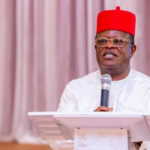A Communications Expert, Dr Charles Ebereonwu, has advocated ‘financial symbiosis’ between the academia and industries for rapid economic development of Nigeria.
Ebereonwu, who is the Country Communications Manager, Total Energies, spoke at an Industry-Academia Linkages Webinar, which held at Petroleum Training Institute (PTI), Effurun, Delta State.
He spoke on the topic, “The Role of Communication in Industry-Academia Collaboration’’, saying that academic communication and industry communication were distinct imperative for economic growth as well.
He added that while academic communication emphasises theoretical foundations to expand knowledge, industry communication boosts practical activities for the achievement of results that meet corporate objectives.
Ebereonwu, who doubles as a scholar on entrepreneurship, advised the academia to adopt the strategies of effective communications beyond the confines of the ivory towers to solve salient problems in the country.
He noted that financial symbiosis between the two vital segments in Nigeria would bring about efficiency and pave the way for rapid economic development.
According to him, financial symbiosis offers solutions to the gap between academia and the industry to address the challenge of production of graduates that are not suitable for the labour market.
He explained that the collaboration would ensure that the funds deployed to retrain fresh graduates who lack functional industry skills could be used to support the academia to produce industry ready graduates.
Also speaking earlier, Dr Henry Adimula, Principal and Chief Executive of PTI, noted that the institute prioritises collaboration with the oil and gas industry in its quest to produce skilled manpower for the sector.
Adimula, represented by Dr. Samuel Onoji, Vice Principal of PTI, noted that there was a wide gap between the academia and the industry in Nigeria.
He said that the PTI was adopting the collaboration with the oil industry curriculum development to position its graduate for jobs in the oil and gas sector.
On her part, Dr Sarah Nwinee, Head, Linkages, Exchanges and Partnerships, PTI, noted that the webinar, the fourth in the series was aimed at deepening its relationship with oil industry experts.
She noted that the policy was responsible for the wide acceptance of PTI’s graduates in the labour market as the emphasis was on hands-on training producing work force which functions in the practical realms.
Nwinee noted that PTI has built lasting relationships with the industry and would continue to deepen the partnerships to develop graduates with industry specific skills for the oil and gas sector.
In a goodwill message, Prof. Joseph Ajienka, of the Emmanuel Egbogah Chair of Petroleum Engineering, University of Port Harcourt, urged the academia in Nigeria to emulate their counterparts in Europe and America where the academia make meaningful economic impact to the society.
He advised PTI to establish innovation hubs to promote entrepreneurship amongst its students, adding that effective communication was fundamental to successful industry-academia collaboration.
He noted that pitching ideas for start-ups was a desirable route to promote entrepreneurship with industry operators investing in promising concepts.
NAN


